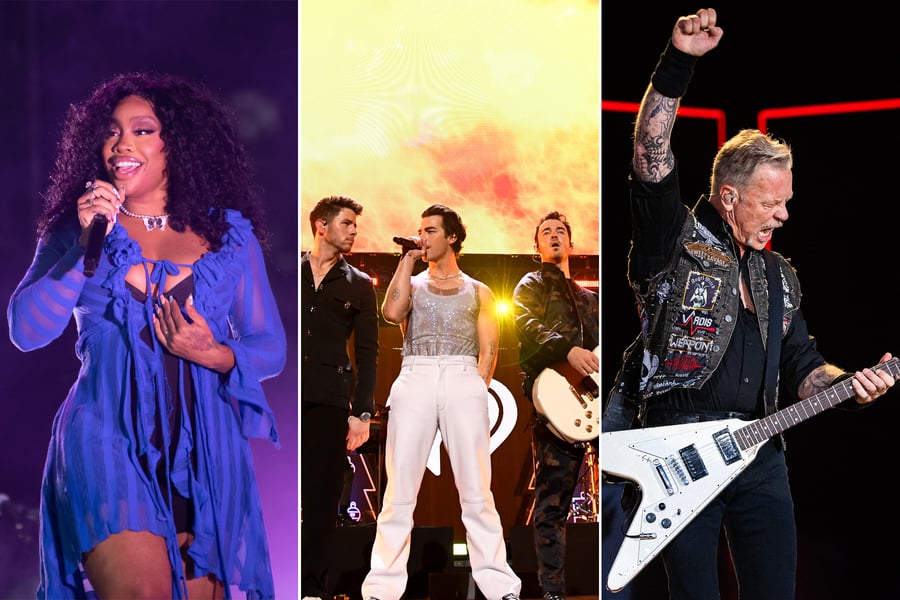Metallica, the Jonas Brothers, SZA, and Usher are among the acts set to help the Global Citizen Festival mark its 10th anniversary with shows taking place in New York City’s Central Park and Black Star Square in Accra, Ghana on Sept. 24.
As always, the Global Citizen Festival will aim to encourage global leaders and corporations to commit billions to issues such as the climate crisis, food shortages, and ensuring a better future for women and girls.
“I’ve now been involved with Global Citizen since 2016, so seven years now,” Priyanka Chopra Jonas, who will host the New York City show, tells Rolling Stone. She adds, “I think the audience that comes in are people who are aware of their power in the world, who have already taken action, who care, and want to help change the world. Being in a crowd of people who care so much — the energy is just electric.”
The New York City show will be headlined by Metallica, who haven’t played the city since 2017. Along with the Jonas Brothers, other artists taking the stage include Rosalía, Mariah Carey, Mickey Guyton, and Måneskin. Meanwhile, the show in Ghana will boast not only Usher and SZA, but H.E.R., Tems, Stormzy, Gyakie, Sarkodie, and Stonebwoy. Tickets to both events are free and can be obtained on the Global Citizen website or app.
On top of all the performances, Global Citizen CEO Hugh Evans says “there’s gonna be some big surprises” to mark the festival’s 10th anniversary at the New York City show. He’s also excited about taking the festival to West Africa for the first time, especially considering 2022 marks the 65th anniversary of Ghanaian independence, and the 20th anniversary of the founding of the African Union.
“Ghana is honoured to host this year’s edition of the Global Citizens Festival. I look forward to welcoming each and everyone of you to Accra, capital of the country at the centre of the world,” Ghana’s president, H.E. Nana Akufo-Addo, says. “Together, let us join hands and help accelerate progress towards the realization of the [sustainable development goals]. We owe to the next generation to live in a world free from poverty, disease and the degradation of the environment. The time to help make a change is now. We must align forces to make an impact in Africa, and help end extreme poverty. I have called colleague African leaders to join me in September, and help break these systemic barriers that have been affecting our people. Let us build a strong foundation for future generations.”
“Doing it live between the two cities on the same night, throwing literally from Black Star Square — which is the site that commemorates Ghanaian independence, as well as that that power of Pan Africanism — [to New York City] is really powerful,” he says. “It shows the symbolism of that journey of the transatlantic slave trade, and what New York City stands for with the Statue of Liberty, freedom, and independence.”
Love Music?
Get your daily dose of everything happening in Australian/New Zealand music and globally.
In the 10 years since the Global Citizen Festival launched, Evans says the events have “resulted in over $41 billion not just committed, but deployed around the world to support NGO partners and impact over a billion lives.” While that money has obviously done a lot of good, both Evans and Chopra Jonas note the variety of issues plaguing the world that still need to be addressed.
“The aim really is to call upon the world leaders to get close the climate financial gap, alleviate the global food crisis, invest in growth and children, and basically end crushing debt in developing countries,” Chopra Jonas says. “And then also aiding women and children around the world. Being a female that was raised by parents that gave me choices and opportunities, and helped create an environment where I thrived, I feel very strongly that women around who weren’t given choices, who don’t know about their rights —that’s a hugely important part about what Global Citizen does.”
While Evans is critical of the “massive leadership deficit” around the world, he’s hopeful that there are ways to turn that around and address these problems that will make a Global Citizen festival 10 years from now feel slightly less urgent.
“I think that success is going to be when we close to climate financing gap. because it’s only a $10 billion gap — that’s not a lot of money to the international community,” he says. “And we need to invest in women and girls — $600 million needs to be deployed right now because getting girls into school is the closest we have to a silver bullet for poverty alleviation. We’re gonna solve the climate financing gap, we’re gonna make sure that countries aren’t in crippling debt, we’re gonna make sure that girls are in school, and that Africa returns to be the breadbasket of the world that it used to be.”
From Rolling Stone US



































